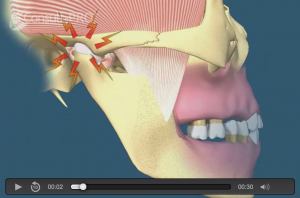TMJ stands for “temporomandibular joint,” which is where the upper and lower jaws connect. A TMJ disorder means that you are experiencing problems with this complex joint and the associated muscles. Since TMJ issues can lead to bigger complications in the future, early detection and treatment are important.
Do You Have a TMJ Disorder?
Common signs of TMJ problems include:
- Unexplainable pain in the jaw
- A clicking, popping, or grating sound when chewing
- The jaw catches or locks sometimes when opening the mouth
- Waking up at night clenching or grinding the teeth
- Sore, stiff jaw muscles in the morning
- Frequent headaches or neck aches
- Misaligned bite
- Your bite is changing for no apparent reason
- Pain when eating and chewing
- Stress intensifies the jaw pain
- Injury to the neck, head, or jaws
- Teeth don’t touch when you bite down
- It’s difficult to use the front teeth when biting food
- Teeth are worn down, broken, loose, or sensitive
CT Scan Evaluation Of The TMJ
TMJ Treatment
Drs. Blecha and Jandali offer a variety of treatment options for TMJ disorders at their Naperville office. First, a thorough evaluation needs to be completed to determine an accurate diagnosis. Often, patients try minimally-invasive treatments through a general dentist, and then they are referred to an oral surgeon if the initial treatments don’t solve the problems. The most effective approach is a combined treatment that utilizes self-care and professional services.
Initially, the goal is to reduce the joint pain and muscle spasming you are experiencing. Treatment recommendations include:
- Resting your jaw
- Relaxing the lower jaw when you are not eating or swallowing (keeping the teeth apart)
- Eating a soft-food diet
- Exercises for the jaw
- Applying heat and ice to reduce symptoms
- Improving posture, which changes the position of the head, neck, and jaw
- Using an anti-inflammatory medication
It also might be recommended that you try stress management techniques. A clear plastic splint or night guard can be used to keep the teeth apart while you are sleeping, helping to relax the muscles at night. Appliances can be used during the day to move the jaw forward and help the jaw heal.
Bite Correction Surgery
When the above treatments aren’t sufficient for managing the pain and discomfort, then bite correction surgery might be recommended. TMJ disorders can cause problems with how the teeth fit together, and it is important to realign the jaws to improve the condition.
Orthodontics, with or without jaw surgery, can be used to realign the jaw position and often result in successful treatment. Sometimes restorative dental work is needed. Rarely, surgical options are required, such as open joint repair restructuring or arthroscopy.
For more information, talk to our experienced team about available surgical treatments for TMJ disorders. Schedule and consultation at our Naperville office at (630) 961-5151.




